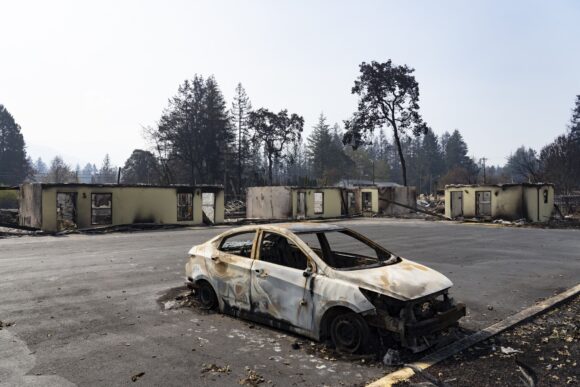A jury ordered a Berkshire Hathaway Energy Co. unit to pay nine homeowners at least $62 million for failing to prevent some Oregon wildfires in 2020, including $9 million for a man who jumped off a cliff into a river to escape the flames that destroyed his home.
Adding to the almost $90 million tab the company faced after an earlier jury found it grossly negligent in June, Tuesday’s verdict in Portland state court capped the first of three “mini-trials” designed to assess how much the largest grid operator in the western US will ultimately have to pay as many as 5,000 victims of the fires.
Based on last year’s award average of more than $5 million for each of 17 property owners, PacifiCorp had previously estimated it could end up on the hook for $11 billion and possibly get pushed into bankruptcy. The company has since replaced its chief executive officer and recently sold $3.8 billion of US investment-grade bonds to help fund wildfire expenses.
“The 2020 wildfires were undeniably tragic,” PacifiCorp said in a statement. “PacifiCorp has settled and will continue to settle all reasonable claims for actual damages under Oregon law.”
The latest verdict includes damages for both economic losses and emotional distress. Attorneys for the victims said it could grow as high as $85 million based on other legal findings.
While destructive wildfires are now an almost routine part of summer in the American West, last year marked the first time that large-scale devastation blamed on a utility’s equipment went to a trial.
The company had already been found liable in the 2023 trial for failing to heed weather warnings and shut off electricity in its service areas ahead of a wind storm that toppled power lines. PacifiCorp, which has settled some claims over the 2020 fires and still faces others, has said it’s confident the liability verdict will be overturned on appeal.
In closing arguments Monday in the first mini-trial, a lawyer for the property owners recounted their experiences during and after the fires and emphasized that many of them thought they would die.
“Each of them in this trial told you about the enduring trauma they had suffered because of PacifiCorp’s fires,” the attorney, Nicholas Rosinia, said Monday. “This is an extraordinary case full of extraordinary stories of survival and of bravery and of life-altering loss.”
Rosinia detailed how Scott Johnson and Mary Beth Carden scrambled through brambles, leapt into the river beside their property and perched themselves on a log while a blaze consumed their hand-built house and the canyon around them. Johnson got the largest single award Tuesday — $485,386 for economic losses and $8.5 million in non-economic damages.
Another victim, 101-year-old World War II veteran Frank King, was left without a single photo of his two wives and three children who have died, the lawyer said. Jurors awarded King $6.2 million.
Defense attorney Per Ramfjord told the jury in his closing that despite Rosinia’s “emotional appeal,” the damages shouldn’t serve as a punishment for PacifiCorp’s regional subsidiary.
“This case is about compensating the plaintiffs — not about trying to send a message to Pacific Power,” Ramfjord said.
PacifiCorp didn’t plan to dispute the $6.3 million in economic damages incurred by all the property owners combined, Ramfjord said Monday. He then proposed specific amounts of non-economic damages for each individual, suggesting that Johnson receive $2 million, and that King be given $1.2 million, in addition to their economic damages.
Cody Berne, an attorney for the property owners, compared PacifiCorp’s tallying of non-economic damages to an episode of the long-running TV game show The Price is Right.
(Updates with company comment in fourth paragraph.)
Top photo: A burnt vehicle sits in the parking lot of a motel destroyed from wildfires in Gates, Oregon, U.S., on Sunday, Sept. 20, 2020. Wildfires have burned nearly 5 million acres, killed at least 27 people, and forced hundreds of thousands to evacuate up and down the West Coast.
Was this article valuable?
Here are more articles you may enjoy.


 One out of 10 Cars Sold in Europe Is Now Made by a Chinese Brand
One out of 10 Cars Sold in Europe Is Now Made by a Chinese Brand  Navigators Can’t Parse ‘Additional Insured’ Policy Wording in Georgia Explosion Case
Navigators Can’t Parse ‘Additional Insured’ Policy Wording in Georgia Explosion Case  Canceled FEMA Review Council Vote Leaves Flood Insurance Reforms in Limbo
Canceled FEMA Review Council Vote Leaves Flood Insurance Reforms in Limbo  Tesla Sued Over Crash That Trapped, Killed Massachusetts Driver
Tesla Sued Over Crash That Trapped, Killed Massachusetts Driver 